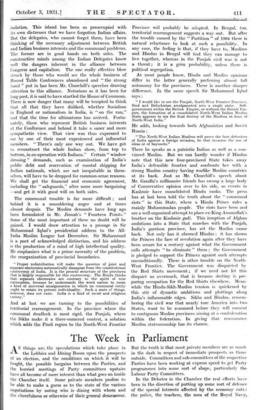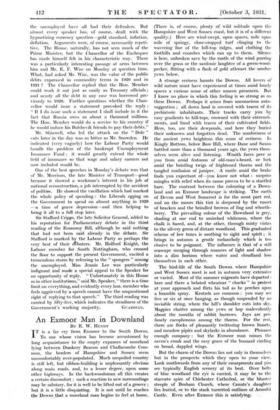The Week in Parliament A S things are, the speculations which
take place in the Lobbies and Dining Room upon the prospects of an election, and the conditions on which it will be fought, the possible bargains between the Parties, and the hurried meetings of Party committees upstairs have all become of more interest than what goes on inside the Chamber itself. Some private members profess to be able to make a guess as to the state of the various negotiations by noting who is dining with whom and the cheerfulness or otherwise of their general demeanour. But the truth is that most private members are as much in the dark in respect of immediate prospects as those outside. Committees and sub-committees of the respective Parties have been working at express speed to get Party programmes into some sort of shape, particularly the Labour Party Committees.
In the Debates in the Chamber the real efforts have been in the direction of putting up some sort of defence of the special interests affected by the economy cuts : the police, the teachers, the men of the Royal Navy, the unemployed have all had their defenders. But almost every speaker has, of course, dealt with the hypnotizing currency question—gold standard, inflation, deflation. Arguments were, of course, necessarily repeti- tive. The House, naturally, has not seen much of the Prime Minister, but' the Chancellor of the Exchequer has made himself felt in his characteristic way. There was a particularly, interesting passage at arms between • him and Mr. E. F. Wise on Monday at question time.: What, had asked Mr. Wise, was the value of the public debts expressed in commodity terms in 1920 and in. 1931 ? The Chancellor replied that the Hon. Member could work it out just as easily as Treasury officials ; and nearly all the debt in any case was borrowed . pre- viously to 1920. Further questions whether the Chan- cellor would issue a statement provoked the reply " If I do issue such a. statement I shall include in it the fact that Russia owes us about a thousand minions. The Hon. Member would do a service to his country if he would induce his Bolshevik friends to pay their debts."
Mr. Shinwell, who led the attack on the "Dole " cuts later in the day was as bitter as Mr. Snowden. He indicated (very vaguely) how the Labour Party would handle the problem of the bankrupt Unemployment Insurance Fund : it would greatly extend the whole field of insurance so that wage and salary earners not now included would be.
One of the best speeches in Monday's debate was that of Mr. Morrison, the late Minister of Transport—good because it showed a workman's interest in his job of national reconstruction, a job interrupted by the accident of polities. He showed the vacillation which had marked the whole policy of spending : the Liberals egging on the Government to spend on almost anything in 1929 —a time of grave depression—and then helping to bring it all to a fun stop later.
Sir Stafford Cripps, the late Solicitor General, added to his reputation for Parliamentary debate in the third reading of the Economy Bill, although he said nothing that had not been said already • in the debate. Sir Stafford is marked by the Labour Party as perhaps the very best of their debaters. Mr. Holford Knight, the Labour member for South Nottingham, who crossed the floor to support the present Government, excited a tremendous storm by referring to the " spongers " among the unemployed. Miss Jennie Lee was particularly indignant and made a special appeal to the Speaker for an opportunity of reply. " Unfortunately in this House as in other institutions," said Mr. Speaker, " there is a time limit on everything, and evidently every hon. member who feels aggrieved by a speech cannot have the unquestioned right of replying to that speech." The third reading was carried by fifty-five, which indicates the steadiness of the Government's working Majority. GUARDIAN.











































 Previous page
Previous page